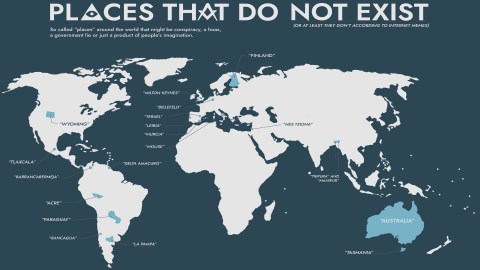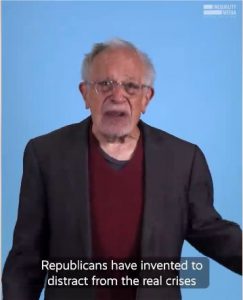- Benjamin Bradford at CFI about how conspiracy theorists shrug about real conspiracy theories;
- Big Think on conspiracy theories about places claimed not to exist;
- Robert Reich on the fake crises Republicans use to distract from real problems.
CFI, Benjamin Bradford, 10 Nov 2023: When Real Conspiracies Are Revealed, Conspiracists Shrug
There *are* some real conspiracy theories — examples in recent years include certain auto makers rigging software so their cars would pass emissions tests, and of course corporate conspiracies over the decades to hide evidence of the deleterious effects of burning fossil fuels and smoking cigarettes — but oddly, these are of little interest to conspiracy theorists. That tells you a lot. (Also, these conspiracies were exposed through the efforts of journalists, i.e. the MSM, mainstream media.) Bradford begins:
Over the past few weeks several prominent and powerful people and companies have been exposed as having been involved in coverups and conspiracies.
Two recent examples:
…the powerful National Association of Realtors and several large brokerages had conspired to artificially inflate the commissions paid to real estate agents.
… former Trump lawyer Sidney Powell pled guilty to conspiracy charges in connection with election fraud conspiracy claims she promoted, endorsing baseless theories of foreign interference and ballot manipulation to try to overturn the election.
Bradford notes the irony.
Despite making headlines, these cases flew under the radar of the conspiracy community and haven’t registered a blip; they couldn’t care less. At first this might seem like a curious contradiction until you realize that these aren’t the right kind of conspiracies they care about. But because they don’t involve the government spraying chemicals in the skies, or hiding alien bodies, or hiring “crisis actors” to fake mass shootings, the conspiracy crowd doesn’t care.
He provides other examples of real conspiracies: the Iran-Contra scandal; Bank of America execs; Archer Daniels Midland and prices of animal feed; General Motors and faulty ignition switches. The last one “resulted in the deaths of at least 120 people and hundreds of injuries.” Bradford concludes,
But these genuine, real, and proven conspiracies aren’t even on the conspiracy believers’ radar. They don’t care about realtor organizations, Trump lawyers, or food additives. Instead they’re deeply concerned about the Illuminati, Jade Helm 15, and gubmint chemtrail programs. Tilting at windmills is much more fun.
\\
This piece recalls childhood, and Creationist, taunts. Did you see it? Were you there?
Big Think, Frank Jacobs, 15 Nov 2023: Why Wyoming doesn’t exist, but Bielefeld does (again), subtitled “In a remarkably similar way, conspiracy theories around the world cast doubt on the existence of real places.”
Key Takeaways
• Some cities, states, or even countries seem so small, far away, and unimportant that it’s tempting to pretend they don’t exist. • The U.S. state of Wyoming and the German city of Bielefeld are prime examples, each the subject of elaborate but playful conspiracies. • Uniquely, the Wyoming conspiracy has a fairly specific starting point: a Garfield episode from 1989.
The image above links to the full-screen map of places around the world that are purported not to exist. Including this recent one: Google search: Finland Does Not Exist. Wikipedia has this page about the Bielefeld conspiracy.
All these conspiracy theories — some of them jokes! for the gullible — play on the limitations of human cognition, and cognitive biases that prioritize local experience over things that are remote and can only be understood intellectually.
The Big Think article has a long list of other places some people claim are not real. But then addresses the philosophical issue about why people think such things. There’s no single serious answer. Or maybe just a deeply philosophical answer. And a joke, which some will believe.
When a Wisconsin high school student emailed all 60 members of the Wyoming State Legislature in 2020 to ask them whether their state existed, Representative Sara Burlingame bounced the question back: “How can we know any of us exist?” And if none of us exist, do we even have to do our homework?
One of her colleagues, Representative Dan Zwonitzer, gave the high schooler an even more disturbing answer: “It’s actually true. We’re a government conspiracy. I’m in a bunker outside the DC area. Just don’t tell anyone.”
\\
A somewhat analogous Robert Reich video. About how many people are attracted to things that are fake, perhaps to avoid thinking seriously about difficult problems that are real.
Facebook, Robert Reich, 8 Nov 2023: 5 Crises Republicans Made up to Distract You
As I’ve said, Republicans think actual problems aren’t real, because addressing them (e.g. climate change) would hurt their corporate donors. So they focus on fake, cultural war, crises. Reich’s five: Woke. Trans-panic. Critical race theory. Couch potatoes (i.e. welfare recipients). And out of control government spending.
Watch Reich as he patiently explains. So many low-information voters are easily played.








